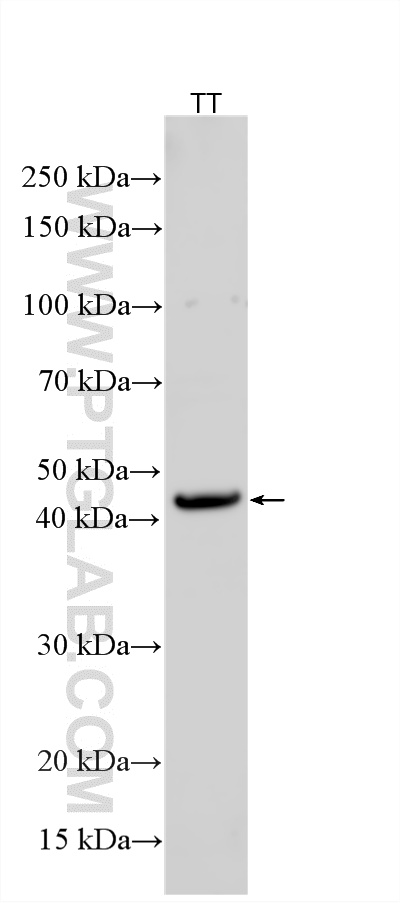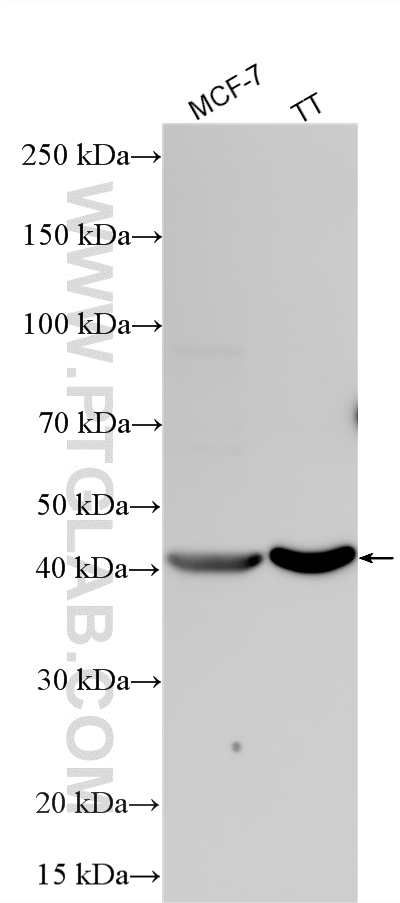验证数据展示
经过测试的应用
| Positive WB detected in | TT cells, MCF-7 cells |
推荐稀释比
| 应用 | 推荐稀释比 |
|---|---|
| Western Blot (WB) | WB : 1:500-1:3000 |
| It is recommended that this reagent should be titrated in each testing system to obtain optimal results. | |
| Sample-dependent, Check data in validation data gallery. | |
产品信息
17845-1-AP targets GCNT1 in WB, ELISA applications and shows reactivity with human samples.
| 经测试应用 | WB, ELISA Application Description |
| 经测试反应性 | human |
| 免疫原 |
CatNo: Ag12264 Product name: Recombinant human GCNT1 protein Source: e coli.-derived, PGEX-4T Tag: GST Domain: 41-428 aa of BC074885 Sequence: VSVRHLELAGENPSSDINCTKVLQGDVNEIQKVKLEILTVKFKKRPRWTPDDYINMTSDCSSFIKRRKYIVEPLSKEEAEFPIAYSIVVHHKIEMLDRLLRAIYMPQNFYCIHVDTKSEDSYLAAVMGIASCFSNVFVASRLESVVYASWSRVQADLNCMKDLYAMSANWKYLINLCGMDFPIKTNLEIVRKLKLLMGENNLETERMPSHKEERWKKRYEVVNGKLTNTGTVKMLPPLETPLFSGSAYFVVSREYVGYVLQNEKIQKLMEWAQDTYSPDEYLWATIQRIPEVPGSLPASHKYDLSDMQAVARFVKWQYFEGDVSKGAPYPPCDGVHVRSVCIFGAGDLNWMLRKHHLFANKFDVDVDLFAIQCLDEHLRHKALETLKH 种属同源性预测 |
| 宿主/亚型 | Rabbit / IgG |
| 抗体类别 | Polyclonal |
| 产品类型 | Antibody |
| 全称 | glucosaminyl (N-acetyl) transferase 1, core 2 (beta-1,6-N-acetylglucosaminyltransferase) |
| 别名 | Beta-1,3-galactosyl-O-glycosyl-glycoprotein beta-1,6-N-acetylglucosaminyltransferase, C2GlcNAcT, C2GNT1, C2GNT-L, Core 2 beta-1,6-N-acetylglucosaminyltransferase |
| 计算分子量 | 428 aa, 50 kDa |
| 观测分子量 | 40-50 kDa |
| GenBank蛋白编号 | BC074885 |
| 基因名称 | GCNT1 |
| Gene ID (NCBI) | 2650 |
| 偶联类型 | Unconjugated |
| 形式 | Liquid |
| 纯化方式 | Antigen affinity purification |
| UNIPROT ID | Q02742 |
| 储存缓冲液 | PBS with 0.02% sodium azide and 50% glycerol, pH 7.3. |
| 储存条件 | Store at -20°C. Stable for one year after shipment. Aliquoting is unnecessary for -20oC storage. |
背景介绍
Glucosaminyl (N-acetyl) transferase 1 (GCNT1, also known as C2GNT1), is a glycosyltransferase enzyme that plays an essential role in the formation of core 2 branched O-glycans that is crucial to the final definition of O-glycan structure (PMID: 37813880). GCNT1 promotes the growth of prostate tumors and regulates oncogenic gene expression pathways that are important for disease progression (PMID: 24854630).



